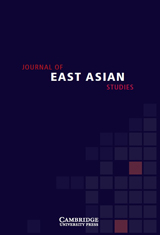
The journal is interested in work that combines theory, novel empirical contributions and engagement with the major substantive issues facing the region. The JEAS publishes primarily in the fields of international relations, including both international political economy and security studies, and comparative politics. However, we welcome interdisciplinary work and contributions from sociology, applied economics and business studies as well. The journal is also open to roundtables on important new books on the region, review essays and shorter research notes.
SSCI indexed, the journal prides itself on a strong peer-review process.For more information on submissions and subscriptions, visit the website at Cambridge University Press.
Editorial Board
| Editor | Stephan HaggardUniversity of California, San Diego |
|---|---|
| Book Review Editor | Yves TiberghienUniversity of British Columbia |
| Managing Editor | Hayeon LeeEast Asia Institute |
Journal of East Asian Studies Current Issue Vol.20 No.1

An Introduction to the Journal of East Asian Studies 20.1
The current issue of the Journal of East Asian Studies leads with an outstanding treatment of how language can influence public opinion on foreign policy. Yue Hu and Amy Liu show that attitudes toward Japan in three diverse East Asian countries—Singapore, Taiwan and China itself—are influenced by speaking a foreign language. Using survey data, they show that proficiency in English is associated with more positive views of Japan, even when controlling for cosmopolitanism and the opportunity to learn English. Social scientists have paid too little attention to the mediating role of language in public opinion.
Two contributions of the volume address fundamental issues of regime type, one contribution on authoritarian rule the other on transitions to democracy. Edmund Malesky and Paul Schuler tackle the perennial question of why citizens of authoritarian regimes show surprising support for their politicians. Is it simply that voters are manipulated, do they genuinely like politicians who perform or do politicians in authoritarian regimes enjoy incumbency advantages? While they provide some evidence for all three, they find that incumbency sends clear signals to voters about policy positions, showing that competitive authoritarian regimes exhibit some political dynamics that are quite similar to those in democratic regimes.
In a fresh contribution to the literature on democratic transitions in Asia, Joon Nak Choi and Ji Yeon Hong show how networks influence transition paths. A puzzle of the South Korean transition to democratic rule is its conservative nature. Mass mobilization produced a transition to a protégé of the outgoing dictator. A conservative party then managed to capture the presidency for a second time. Using a novel individual-level dataset of legislators, they show how dense social networks linked members of the merged conservative parties, while pro-democracy forces had much weaker ties, hindering political cooperation despite shared ideologies and policy goals.
The JEAS is committed to publishing high quality work in both comparative politics and international relations, and Chaekwang You and Wonjae Kim tackle an issue that is highly salient at the moment: possible domestic sources of tension in the Japan-Korea relationship. Using both statistical techniques and a convincing narrative account, they show how Korean leaders are inclined to divert public opinion toward conflict with Japan when they suffer domestic political setbacks.
Finally, we welcome proposals for roundtables and exchanges that highlight issues of interest to scholars of East and Southeast Asia and of particular countries. For students of Thailand, the expansion of the healthcare system has long been a subject of interest: how did such a fragmented polity pull off the trick of universal healthcare? The debate continues, and Joseph Harris and Joel Selway outline competing positions on it. Selway comes out of an institutionalist approach emphasizing electoral rules and the role of parties. Harris takes a more sociological approach considering the powerful role played by health care professionals. The issue is a much broader one: how do we marry institutional and behavioral approaches, and particularly those that emphasize the role of insider interest groups? As the roundtable shows, an apparently narrow issue opens out onto fundamental questions of causal inference, qualitative vs. quantitative research, and how we understand the policymaking process.
ARTICLES
- 2020-03-11
- Edmund Malesky and Paul Schuler
- 2020-03-11
- Yue Hu and Amy H. Liu
- 2020-03-11
- Joon Nak Choi and Ji Yeon Hong
- 2020-03-11
- Chaekwang You and Wonjae Kim
- 2020-03-11
- Joseph Harris and Joel Selway
BOOK REVIEWS
- 2020-03-11
- Sukitha Bandaranayake
- 2020-03-11
- Yongzhen Jin
- 2020-03-11
- Gwendolyn J. Culver
- 2020-03-11
- Brenda Van Coppenolle
- 2020-03-11
- Panthea Pourmalek
Submission Guidelines
Manuscripts may be in the form of articles (approximately 10,000 words), review essays or commentaries (3,000 words), or book reviews (1,000 words).
Manuscripts for articles, review essays, and research notes should be submitted electronically, via the JEAS ScholarOne site.
To submit an article, please visit https://mc.manuscriptcentral.com/joeas.
Correspondence concerning book reviews should be sent to Yves Tiberghien, Journal of East Asian Studies Book Review Editor, Department of Political Science, University of British Columbia, Buchanan C 416, 1866 Main Mall, Vancouver, British Columbia V6T 1Z1, Canada.Phone: 604-822-4358; fax: 604-822-5540; email: yvestibe@politics.ubc.ca.
Subscribe
| Year | Category | Access Type | Price |
|---|---|---|---|
| 2020 | Institutions | Online only | $216 |
| 2020 | Institutions | Online & Print | $240 |
| 2020 | Individual | Online only | $70 |
| 2020 | Individual | Online & Print | $78 |